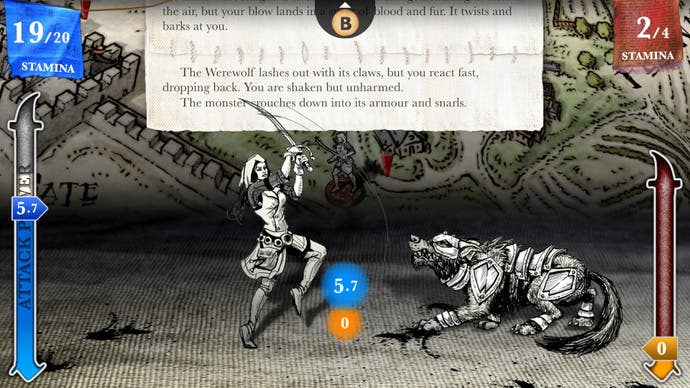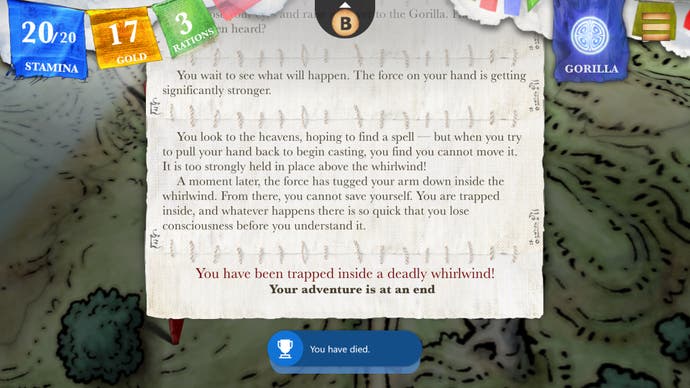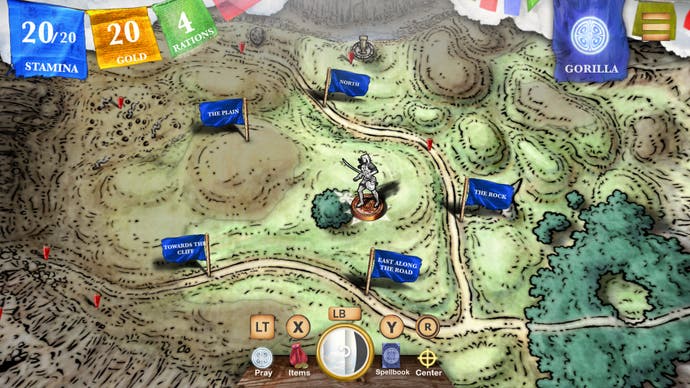Sorcery! finally comes to console, but it's not the port it deserves
Not enough Khar¨¦.
The original Sorcery! games on mobile made a strong impression on me. They were my first encounter with Inkle, a studio I'm now besotted with, and they were among my first encounters with deeper, more substantial mobile games. In fact, at the time - and this was quite a long time ago - I couldn't believe my hunk-a-junk iPhone 4 was capable of something so beautiful.
I still see Sorcery!'s gorgeous world maps in my mind - maps I now know are drawn by the superbly talented Mike Schley; I still hear Vaughan Williams' Fantasia on a Theme by Thomas Tallis in my ears; and, perhaps more importantly, I still think about the situations the game presented me with - the unpredictability of their outcomes, the strangeness of the encounters, and the wonderfully sobering realisation the game wasn't afraid to kill me for taking a wrong turn.
Of course, a lot of this comes from the source material: the old Steve Jackson Sorcery! game books. But there's also so much of what I've come to know as Inkle in there too - a cheekiness and a fondness for upending convention and doing what you don't expect. And perhaps above all: a skill with wielding words in text-based adventures that I think is unmatched.
But Sorcery! was overshadowed by the studio's own success with 80 Days and by the prestige of Heaven's Vault, and fractured by appearing on both mobile and eventually PC, where it failed to make much impact. Time passed and Sorcery! was forgotten. But now it's back.
For the first time, Sorcery! is available on consoles. The whole four-game series has been bundled up and released on Switch, Xbox and PlayStation (it was released yesterday, 23rd June). And immediately upon playing it on Xbox Series S, I'm struck by how absorbing the adventure still is.
It's something to do with the tightness of the game-book premise, I think, and how there's always a decision to make no matter what you're doing. There's also something I find endlessly fascinating in the apparently limitless possibilities of the narrative outcomes in the game, the consequences. Theoretically, anything can happen - I can just as soon die for some completely unexpected reason as I can succeed. The rules don't seem bound in mathematics and systems as in other games. They are bound only by imagination.
I actually find it startling that adventures as old as these - sorry Steve! - still wield so much entertainment power, and still feel so absorbing and fresh. Maybe it's precisely because they come from a different era that they are so deliciously unfamiliar now. Or it could just be Steve Jackson has a wonderful imagination. Whatever the reason, the outcome is magical.

It's that, really, and the original quality of the Sorcery! games which makes them worthwhile returning to now. Sadly, though, little else seems to have been done to them to mark their console arrival. It would have been nice to see them embellished for the bigger screen, whereas instead, they feel stretched for it, like simple mobile ports. And at this size, it feels clunky, as though something of the delicacy of the game on smaller screens has been lost in the transition.
There's a quietness to the games which is noticeable in the living room too. Maybe it's not as apparent on mobile, but the ambient noises, when they are there, are hard to pick up, and if you increase the volume, the sporadic orchestral blasts that play at milestone moments or when you open your spell book are deafening. There's no real audio feedback from moment to moment either. When you're interacting with the game's papery pages, there's no ruffling noises or quill-on-parchment scratching. It's just still and a bit stagnant.
It's a shame. It all adds up to a feeling of missed opportunity, that this was a chance to really polish the Sorcery! games up for an audience that didn't notice them the first time around. An opportunity to harness some of the technological advancements made in the near-decade since the series began and give it a proper second chance. There's still a lot to like, and the games have aged remarkably well, but they are undeniably old and mobile, and the port doesn't do much to change that.



